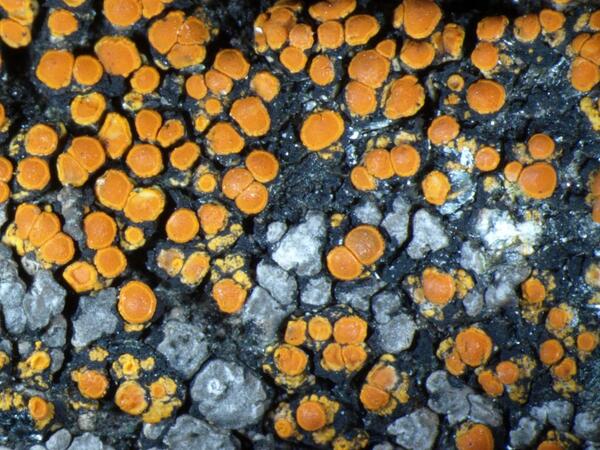Variospora macrocarpa (Anzi) Arup, Søchting & Frödén
Nord. J. Bot., 31: 75, 2013. Basionym: Placodium aurantiacum var. macrocarpum Anzi - Cat. Lich. Sondr.: 43, 1860.
Synonyms: Caloplaca macrocarpa (Anzi) Zahlbr.
Distribution: N - TAA (Nascimbene & al. 2022), Lomb.
Description: Thallus crustose, episubstratic, yellow-orange to orange, consisting of more or less dispersed areoles-granules which are mostly hidden by the apothecia, sometimes poorly developed and inapparent. Apothecia usually abundant, zeorine, sessile, c. 1 mm across, with a flat to slightly convex, orange-red disc, and a paler, persistent margin. Epithecium orange, K+ red; hymenium colourless; paraphyses simple or sparingly branched, c. 2 μm thick at base, with swollen apical cells; hypothecium colourless. hyaline, very variable, Ascospores 2-celled, polarilocular, hyaline, ellipsoid to broadly ellipsoid, 10-13 x 6-10 μm, the equatorial thickening (“septum”) up to 4 μm. Pycnidia orange, immersed. Conidia bacilliform. Photobiont chlorococcoid. Spot tests: thallus and apothecia K+ red, C-, KC-, P-. Chemistry: thallus and apothecia with parietin (major), fallacinal, emodin, teloschistin and parietinic acid (minor), corresponding with chemosyndrome A of Søchting (1997).Note: this poorly known species growing on calcareous rocks, with optimum above the montane belt, appears to be common in the Austrian Alps and should be looked for more intensively in Italy. According to Vondrák (in litt.), however, most of the material called Caloplaca macrocarpa by Poelt and Hafellner (GZU) belongs to Athallia brachyspora (Mereschk.) Halıcı & Vondrák, which is locally common on base-rich siliceous and limestone rocks in the European mountains (see Palice & al. 2018).
Growth form: Crustose placodiomorph
Substrata: rocks
Photobiont: green algae other than Trentepohlia
Reproductive strategy: mainly sexual
Commonnes-rarity: (info)
Alpine belt: very rare
Subalpine belt: very rare
Oromediterranean belt: absent
Montane belt: absent
Submediterranean belt: absent
Padanian area: absent
Humid submediterranean belt: absent
Humid mediterranean belt: absent
Dry mediterranean belt: absent

Predictive model
Growth form: Crustose placodiomorph
Substrata: rocks
Photobiont: green algae other than Trentepohlia
Reproductive strategy: mainly sexual
Commonnes-rarity: (info)
Alpine belt: very rare
Subalpine belt: very rare
Oromediterranean belt: absent
Montane belt: absent
Submediterranean belt: absent
Padanian area: absent
Humid submediterranean belt: absent
Humid mediterranean belt: absent
Dry mediterranean belt: absent

Predictive model
 INDEX FUNGORUM
INDEX FUNGORUM
 GBIF
GBIF
 DOLICHENS
DOLICHENS


